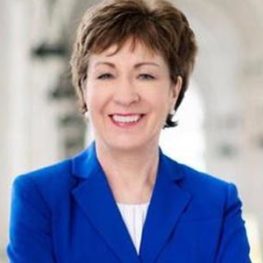Senators Introduce Bill to Expand Access for Kids to WGS Through Medicaid
January 7, 2020
A bipartisan group of U.S. senators have introduced legislation they say will help thousands of children with rare diseases get a diagnosis and proper treatment faster through whole genome sequencing.

Photo: Senator Susan Collins, R-Maine
Children with rare diseases face a “diagnostic odyssey” that typically lasts five to seven years and entails seeing an average of seven different physicians. About 30 percent of these children do not survive beyond the age of five years old.
“Whole genome sequencing has changed the lives of those with genetic conditions, like Alström Syndrome, by enabling earlier and more accurate diagnoses, fostering more timely and appropriate medical care, and unlocking a host of social services to combat the educational and psycho-social complications that our children confront,” said Robin Marshall, executive director of the Alström Syndrome International, which is supporting the legislation. “That anyone would be denied access to WGS, particularly children on Medicaid suspected to have genetic conditions like Alström Syndrome, is unfathomable.”
The Ending the Diagnostic Odyssey Act would allow states to conduct whole genome sequencing services for children on Medicaid with a disease suspected to have a genetic cause. Under the three-year pilot program, the federal medical assistance percentage (FMAP) would be 75 percent. WGS is the most robust genetic test available and the only test that can detect nearly all types of genetic variants.
Senators Susan Collins (R-Maine), Doug Jones (D-Alabama), Martha McSally (R-Arizona), and Bob Menendez (D-New Jersey) introduced the bill.
“For parents of children with an undiagnosed illness, answers cannot come soon enough. The wait to find a cause – never mind a cure – can be excruciating. Parents try to project a calm and reassuring presence for their child while facing a whirlwind of doctor appointments, hospital visits, and unanswered questions,” said Senator Collins. “By giving states an incentive to provide whole genome sequencing for eligible children through Medicaid, our bipartisan legislation will ensure that more children and their families can obtain the right diagnosis and treatment from the start.”
More than 100 patient advocacy organizations are supporting the legislation, including the Genetic Alliance, Parent Project Muscular Dystrophy, Tuberous Sclerosis Alliance, Alström Syndrome International, Epilepsy Foundation, and the Asthma and Allergy Foundation of America.
Author: Rare Daily Staff

Stay Connected
Sign up for updates straight to your inbox.
